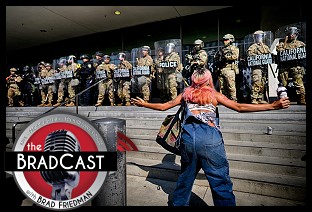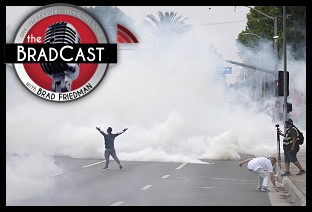 The recent decision by a unanimous three judge panel of the U.S. 5th Circuit Court of Appeal in Veasey v. Abbott was greeted as "very good news." After all, it marked the first occasion in which a federal appellate court made an express finding that a state-enacted polling place Photo ID law violated the provisions of Section 2 of the Voting Rights Act (VRA).
The recent decision by a unanimous three judge panel of the U.S. 5th Circuit Court of Appeal in Veasey v. Abbott was greeted as "very good news." After all, it marked the first occasion in which a federal appellate court made an express finding that a state-enacted polling place Photo ID law violated the provisions of Section 2 of the Voting Rights Act (VRA).
The appellate panel affirmed the lower U.S. District Court's finding late last year that a Texas polling place Photo ID law (SB 14), which threatened to disenfranchise 608,470 already legally registered voters (and many others not already registered), disparately impacted minorities and the poor. "Hispanic registered voters and Black registered voters," the 5th Circuit appellate panel observed in their recent ruling, "were respectively 195% and 305% more likely than their Anglo peers to lack [the requisite Photo] ID" now required to cast a vote at the polls under the Texas law.
This was the same conservative appellate panel whose "emergency" stay of the lower court's injunction on SB 14 last year, in all likelihood, helped to facilitate the illegal disenfranchisement of as many as 600,000 lawfully registered voters during the 2014 mid-term election. That "emergency" stay was subsequently affirmed by a sharply divided Supreme Court, whose right-wing majority elevated the risk of confusion that could arise by an eleventh-hour, court-ordered change in election laws above the risk that hundreds of thousands of lawfully registered voters could be illegally disenfranchised by reason of the Texas Photo ID law. Both the 5th Circuit and the SCOTUS majority handed down that ruling, although, at that point, neither court was in a position to contest the District Court's finding that SB-14 not only violated Section 2 of the VRA but that the Photo ID statute had been enacted for a discriminatory purpose.
The SCOTUS decision last year, as The BRAD BLOG observed at the time, belied the contention made by the Supreme Court majority in Shelby County v. Holder, the 2013 case that gutted the VRA, that their destruction of Section 5 pre-clearance requirements for new election laws in states with a history of discrimination, "in no way affects the permanent, nationwide ban on racial discrimination in voting found in [Section] 2." In truth, per last year's decision, racial discrimination in voting will be allowed in those cases where a court order upholding that "ban" is issued too close to an election.
This case provided a classic example of the damage wrought by the gutting of Section 5. Prior to Shelby County, Section 5 mandated that Texas prove that its Photo ID statute woulds not have a disparate impact on minority voting rights before the Photo ID law could take effect. In 2012 a unanimous three-judge panel of the D.C. Circuit Court of Appeal refused to grant Section 5 pre-clearance to Texas' SB 14 precisely because of its disparate adverse impact upon minorities and the poor. Absent the Supreme Court's troubling decision in Shelby County neither the current, ongoing costly litigation on SB 14, nor the mass 2014 disenfranchisement would have ensued.
The new 5th Circuit panel's decision affirms that SB 14 has the effect of discriminating against racial minorities and the poor. Yet it failed to lift a stay that it imposed on a supposed "emergency" basis. Instead, it vacated the District Court's "discriminatory purpose" finding and remanded the case back to that court for further adjudication....


 Sunday 'Total Obliteration' Toons
Sunday 'Total Obliteration' Toons Thank You For Your Attention to This Matter:
Thank You For Your Attention to This Matter: 'Green News Report' 6/26/25
'Green News Report' 6/26/25
 Mamdani Primary 'Win' Augurs New Generation of Progressives Rising: 'BradCast' 6/25/25
Mamdani Primary 'Win' Augurs New Generation of Progressives Rising: 'BradCast' 6/25/25 U.S. Authoritarianism Under-way (But We're Still Here to Fight It): 'BradCast' 6/24/25
U.S. Authoritarianism Under-way (But We're Still Here to Fight It): 'BradCast' 6/24/25 'Green News Report' 6/24/25
'Green News Report' 6/24/25 'Anti-War' Trump Attacks a Mid-East Nation on False Claims About WMD: 'BradCast' 6/23/25
'Anti-War' Trump Attacks a Mid-East Nation on False Claims About WMD: 'BradCast' 6/23/25  Sunday 'Peacemaker' Toons
Sunday 'Peacemaker' Toons Senate Health Care Cuts 'More Extreme' Than House Version: 'BradCast' 6/19/25
Senate Health Care Cuts 'More Extreme' Than House Version: 'BradCast' 6/19/25 'Green News Report' 6/19/25
'Green News Report' 6/19/25 What 'Anti-War President'? MAGA Civil War Over Trump, Iran: 'BradCast' 6/18/25
What 'Anti-War President'? MAGA Civil War Over Trump, Iran: 'BradCast' 6/18/25 Trump Calls for 'Remigration', a Codeword for 'Ethnic Cleansing': 'BradCast' 6/17/25
Trump Calls for 'Remigration', a Codeword for 'Ethnic Cleansing': 'BradCast' 6/17/25 'Green News Report' 6/17/25
'Green News Report' 6/17/25 Last Weekend Today: 'BradCast' 6/16/25
Last Weekend Today: 'BradCast' 6/16/25 Sunday 'Despot Times, Despot Measures' Toons
Sunday 'Despot Times, Despot Measures' Toons Then They Came for the U.S. Senators: 'BradCast' 6/12/25
Then They Came for the U.S. Senators: 'BradCast' 6/12/25 'Green News Report' 6/12/25
'Green News Report' 6/12/25 Lawless Trump Warms Up for Insurrection Act: 'BradCast' 6/11/25
Lawless Trump Warms Up for Insurrection Act: 'BradCast' 6/11/25 Trump Inciting Violence, State of Fear in L.A., Elsewhere: 'BradCast' 6/10/25
Trump Inciting Violence, State of Fear in L.A., Elsewhere: 'BradCast' 6/10/25 Nevermind Elon and Epstein Files, Trump Declares L.A. 'Riots'!: 'BradCast' 6/9/25
Nevermind Elon and Epstein Files, Trump Declares L.A. 'Riots'!: 'BradCast' 6/9/25 'Jesus Weeps' at Trump's
'Jesus Weeps' at Trump's 300k 'Preventable' Deaths Since Trump USAID Shutdown: 'BradCast' 6/4/25
300k 'Preventable' Deaths Since Trump USAID Shutdown: 'BradCast' 6/4/25 Storm Warnings: 'BradCast' 6/3/25
Storm Warnings: 'BradCast' 6/3/25 SCOTUS Ignores Own Precedents In Recent 'Emergency' Rulings: 'BradCast' 6/2/25
SCOTUS Ignores Own Precedents In Recent 'Emergency' Rulings: 'BradCast' 6/2/25 'A World of Tyrants, Bribes, and Influence': 'BradCast' 5/22/25
'A World of Tyrants, Bribes, and Influence': 'BradCast' 5/22/25
 VA GOP VOTER REG FRAUDSTER OFF HOOK
VA GOP VOTER REG FRAUDSTER OFF HOOK Criminal GOP Voter Registration Fraud Probe Expanding in VA
Criminal GOP Voter Registration Fraud Probe Expanding in VA DOJ PROBE SOUGHT AFTER VA ARREST
DOJ PROBE SOUGHT AFTER VA ARREST Arrest in VA: GOP Voter Reg Scandal Widens
Arrest in VA: GOP Voter Reg Scandal Widens ALL TOGETHER: ROVE, SPROUL, KOCHS, RNC
ALL TOGETHER: ROVE, SPROUL, KOCHS, RNC LATimes: RNC's 'Fired' Sproul Working for Repubs in 'as Many as 30 States'
LATimes: RNC's 'Fired' Sproul Working for Repubs in 'as Many as 30 States' 'Fired' Sproul Group 'Cloned', Still Working for Republicans in At Least 10 States
'Fired' Sproul Group 'Cloned', Still Working for Republicans in At Least 10 States FINALLY: FOX ON GOP REG FRAUD SCANDAL
FINALLY: FOX ON GOP REG FRAUD SCANDAL COLORADO FOLLOWS FLORIDA WITH GOP CRIMINAL INVESTIGATION
COLORADO FOLLOWS FLORIDA WITH GOP CRIMINAL INVESTIGATION CRIMINAL PROBE LAUNCHED INTO GOP VOTER REGISTRATION FRAUD SCANDAL IN FL
CRIMINAL PROBE LAUNCHED INTO GOP VOTER REGISTRATION FRAUD SCANDAL IN FL Brad Breaks PA Photo ID & GOP Registration Fraud Scandal News on Hartmann TV
Brad Breaks PA Photo ID & GOP Registration Fraud Scandal News on Hartmann TV  CAUGHT ON TAPE: COORDINATED NATIONWIDE GOP VOTER REG SCAM
CAUGHT ON TAPE: COORDINATED NATIONWIDE GOP VOTER REG SCAM CRIMINAL ELECTION FRAUD COMPLAINT FILED AGAINST GOP 'FRAUD' FIRM
CRIMINAL ELECTION FRAUD COMPLAINT FILED AGAINST GOP 'FRAUD' FIRM RICK SCOTT GETS ROLLED IN GOP REGISTRATION FRAUD SCANDAL
RICK SCOTT GETS ROLLED IN GOP REGISTRATION FRAUD SCANDAL VIDEO: Brad Breaks GOP Reg Fraud Scandal on Hartmann TV
VIDEO: Brad Breaks GOP Reg Fraud Scandal on Hartmann TV RNC FIRES NATIONAL VOTER REGISTRATION FIRM FOR FRAUD
RNC FIRES NATIONAL VOTER REGISTRATION FIRM FOR FRAUD EXCLUSIVE: Intvw w/ FL Official Who First Discovered GOP Reg Fraud
EXCLUSIVE: Intvw w/ FL Official Who First Discovered GOP Reg Fraud GOP REGISTRATION FRAUD FOUND IN FL
GOP REGISTRATION FRAUD FOUND IN FL



















 It was a much bigger show today than we had expected when we started it!
It was a much bigger show today than we had expected when we started it!
 Last week, Federal Election Commission (FEC) disclosures for the 2016 Presidential contest confirmed that wealthy Super PAC donors are now spending more than three times as much as small donors. As Politico
Last week, Federal Election Commission (FEC) disclosures for the 2016 Presidential contest confirmed that wealthy Super PAC donors are now spending more than three times as much as small donors. As Politico  As you know, last week, Hillary Clinton gave a
As you know, last week, Hillary Clinton gave a  Investigative journalist Tim Shorrock joins me on today's
Investigative journalist Tim Shorrock joins me on today's  Oh, look! NPR says
Oh, look! NPR says 







 The polling place Photo ID voting restriction enacted by Republicans in Texas has been
The polling place Photo ID voting restriction enacted by Republicans in Texas has been  It was a very busy
It was a very busy  The Texas
The Texas  Despite a larger population and a contested race for an open gubernatorial seat, turnout in the state of Texas was reportedly down this year, as compared to the last mid-term election in 2010, by more than a quarter of a million votes.
Despite a larger population and a contested race for an open gubernatorial seat, turnout in the state of Texas was reportedly down this year, as compared to the last mid-term election in 2010, by more than a quarter of a million votes. Attorneys for U.S. Congressman Mark Veasey (D-TX) and other plaintiffs have filed an
Attorneys for U.S. Congressman Mark Veasey (D-TX) and other plaintiffs have filed an  In a
In a 












